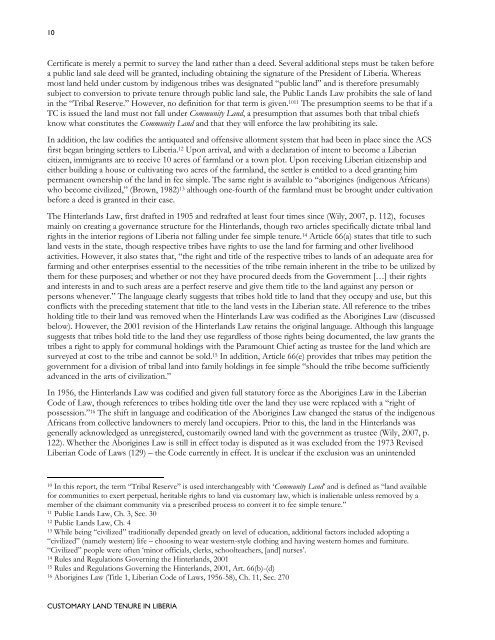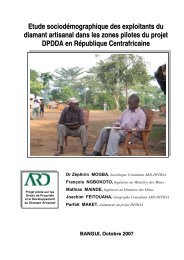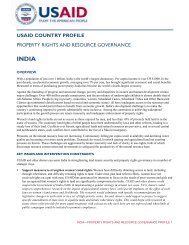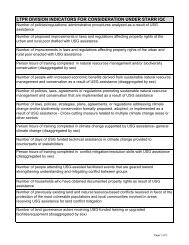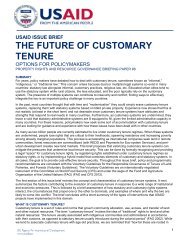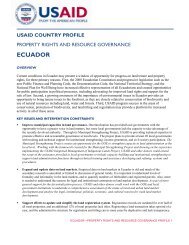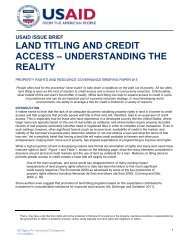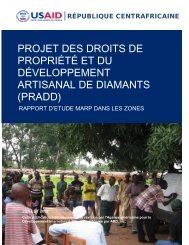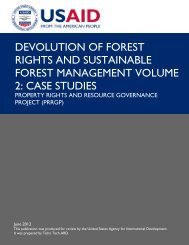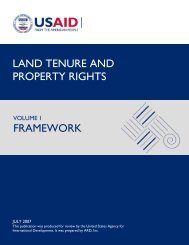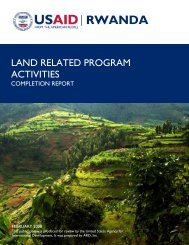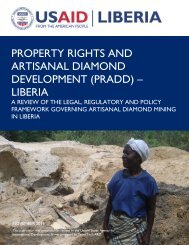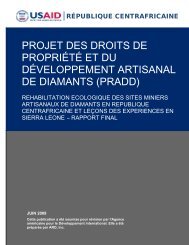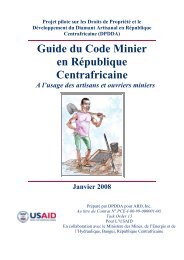Customary Land Tenure in Liberia - Land Tenure and Property ...
Customary Land Tenure in Liberia - Land Tenure and Property ...
Customary Land Tenure in Liberia - Land Tenure and Property ...
Create successful ePaper yourself
Turn your PDF publications into a flip-book with our unique Google optimized e-Paper software.
10<br />
Certificate is merely a permit to survey the l<strong>and</strong> rather than a deed. Several additional steps must be taken before<br />
a public l<strong>and</strong> sale deed will be granted, <strong>in</strong>clud<strong>in</strong>g obta<strong>in</strong><strong>in</strong>g the signature of the President of <strong>Liberia</strong>. Whereas<br />
most l<strong>and</strong> held under custom by <strong>in</strong>digenous tribes was designated “public l<strong>and</strong>” <strong>and</strong> is therefore presumably<br />
subject to conversion to private tenure through public l<strong>and</strong> sale, the Public <strong>L<strong>and</strong></strong>s Law prohibits the sale of l<strong>and</strong><br />
<strong>in</strong> the “Tribal Reserve.” However, no def<strong>in</strong>ition for that term is given. 1011 The presumption seems to be that if a<br />
TC is issued the l<strong>and</strong> must not fall under Community <strong>L<strong>and</strong></strong>, a presumption that assumes both that tribal chiefs<br />
know what constitutes the Community <strong>L<strong>and</strong></strong> <strong>and</strong> that they will enforce the law prohibit<strong>in</strong>g its sale.<br />
In addition, the law codifies the antiquated <strong>and</strong> offensive allotment system that had been <strong>in</strong> place s<strong>in</strong>ce the ACS<br />
first began br<strong>in</strong>g<strong>in</strong>g settlers to <strong>Liberia</strong>. 12 Upon arrival, <strong>and</strong> with a declaration of <strong>in</strong>tent to become a <strong>Liberia</strong>n<br />
citizen, immigrants are to receive 10 acres of farml<strong>and</strong> or a town plot. Upon receiv<strong>in</strong>g <strong>Liberia</strong>n citizenship <strong>and</strong><br />
either build<strong>in</strong>g a house or cultivat<strong>in</strong>g two acres of the farml<strong>and</strong>, the settler is entitled to a deed grant<strong>in</strong>g him<br />
permanent ownership of the l<strong>and</strong> <strong>in</strong> fee simple. The same right is available to “aborig<strong>in</strong>es (<strong>in</strong>digenous Africans)<br />
who become civilized,” (Brown, 1982) 13 although one-fourth of the farml<strong>and</strong> must be brought under cultivation<br />
before a deed is granted <strong>in</strong> their case.<br />
The H<strong>in</strong>terl<strong>and</strong>s Law, first drafted <strong>in</strong> 1905 <strong>and</strong> redrafted at least four times s<strong>in</strong>ce (Wily, 2007, p. 112), focuses<br />
ma<strong>in</strong>ly on creat<strong>in</strong>g a governance structure for the H<strong>in</strong>terl<strong>and</strong>s, though two articles specifically dictate tribal l<strong>and</strong><br />
rights <strong>in</strong> the <strong>in</strong>terior regions of <strong>Liberia</strong> not fall<strong>in</strong>g under fee simple tenure. 14 Article 66(a) states that title to such<br />
l<strong>and</strong> vests <strong>in</strong> the state, though respective tribes have rights to use the l<strong>and</strong> for farm<strong>in</strong>g <strong>and</strong> other livelihood<br />
activities. However, it also states that, “the right <strong>and</strong> title of the respective tribes to l<strong>and</strong>s of an adequate area for<br />
farm<strong>in</strong>g <strong>and</strong> other enterprises essential to the necessities of the tribe rema<strong>in</strong> <strong>in</strong>herent <strong>in</strong> the tribe to be utilized by<br />
them for these purposes; <strong>and</strong> whether or not they have procured deeds from the Government […] their rights<br />
<strong>and</strong> <strong>in</strong>terests <strong>in</strong> <strong>and</strong> to such areas are a perfect reserve <strong>and</strong> give them title to the l<strong>and</strong> aga<strong>in</strong>st any person or<br />
persons whenever.” The language clearly suggests that tribes hold title to l<strong>and</strong> that they occupy <strong>and</strong> use, but this<br />
conflicts with the preced<strong>in</strong>g statement that title to the l<strong>and</strong> vests <strong>in</strong> the <strong>Liberia</strong>n state. All reference to the tribes<br />
hold<strong>in</strong>g title to their l<strong>and</strong> was removed when the H<strong>in</strong>terl<strong>and</strong>s Law was codified as the Aborig<strong>in</strong>es Law (discussed<br />
below). However, the 2001 revision of the H<strong>in</strong>terl<strong>and</strong>s Law reta<strong>in</strong>s the orig<strong>in</strong>al language. Although this language<br />
suggests that tribes hold title to the l<strong>and</strong> they use regardless of those rights be<strong>in</strong>g documented, the law grants the<br />
tribes a right to apply for communal hold<strong>in</strong>gs with the Paramount Chief act<strong>in</strong>g as trustee for the l<strong>and</strong> which are<br />
surveyed at cost to the tribe <strong>and</strong> cannot be sold. 15 In addition, Article 66(e) provides that tribes may petition the<br />
government for a division of tribal l<strong>and</strong> <strong>in</strong>to family hold<strong>in</strong>gs <strong>in</strong> fee simple “should the tribe become sufficiently<br />
advanced <strong>in</strong> the arts of civilization.”<br />
In 1956, the H<strong>in</strong>terl<strong>and</strong>s Law was codified <strong>and</strong> given full statutory force as the Aborig<strong>in</strong>es Law <strong>in</strong> the <strong>Liberia</strong>n<br />
Code of Law, though references to tribes hold<strong>in</strong>g title over the l<strong>and</strong> they use were replaced with a “right of<br />
possession.” 16 The shift <strong>in</strong> language <strong>and</strong> codification of the Aborig<strong>in</strong>es Law changed the status of the <strong>in</strong>digenous<br />
Africans from collective l<strong>and</strong>owners to merely l<strong>and</strong> occupiers. Prior to this, the l<strong>and</strong> <strong>in</strong> the H<strong>in</strong>terl<strong>and</strong>s was<br />
generally acknowledged as unregistered, customarily owned l<strong>and</strong> with the government as trustee (Wily, 2007, p.<br />
122). Whether the Aborig<strong>in</strong>es Law is still <strong>in</strong> effect today is disputed as it was excluded from the 1973 Revised<br />
<strong>Liberia</strong>n Code of Laws (129) – the Code currently <strong>in</strong> effect. It is unclear if the exclusion was an un<strong>in</strong>tended<br />
10 In this report, the term “Tribal Reserve” is used <strong>in</strong>terchangeably with „Community <strong>L<strong>and</strong></strong>‟ <strong>and</strong> is def<strong>in</strong>ed as “l<strong>and</strong> available<br />
for communities to exert perpetual, heritable rights to l<strong>and</strong> via customary law, which is <strong>in</strong>alienable unless removed by a<br />
member of the claimant community via a prescribed process to convert it to fee simple tenure.”<br />
11 Public <strong>L<strong>and</strong></strong>s Law, Ch. 3, Sec. 30<br />
12 Public <strong>L<strong>and</strong></strong>s Law, Ch. 4<br />
13 While be<strong>in</strong>g “civilized” traditionally depended greatly on level of education, additional factors <strong>in</strong>cluded adopt<strong>in</strong>g a<br />
“civilized” (namely western) life – choos<strong>in</strong>g to wear western-style cloth<strong>in</strong>g <strong>and</strong> hav<strong>in</strong>g western homes <strong>and</strong> furniture.<br />
“Civilized” people were often „m<strong>in</strong>or officials, clerks, schoolteachers, [<strong>and</strong>] nurses‟.<br />
14 Rules <strong>and</strong> Regulations Govern<strong>in</strong>g the H<strong>in</strong>terl<strong>and</strong>s, 2001<br />
15 Rules <strong>and</strong> Regulations Govern<strong>in</strong>g the H<strong>in</strong>terl<strong>and</strong>s, 2001, Art. 66(b)-(d)<br />
16 Aborig<strong>in</strong>es Law (Title 1, <strong>Liberia</strong>n Code of Laws, 1956-58), Ch. 11, Sec. 270<br />
CUSTOMARY LAND TENURE IN LIBERIA


